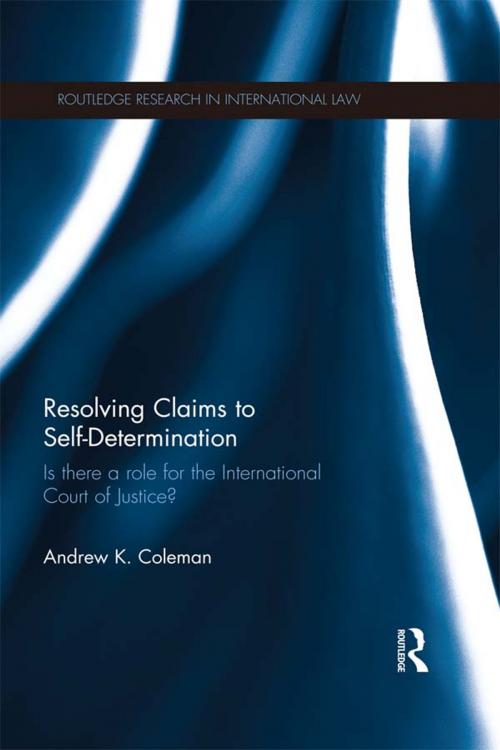Resolving Claims to Self-Determination
Is There a Role for the International Court of Justice?
Nonfiction, Reference & Language, Law, Courts, International, Social & Cultural Studies, Political Science, International Relations| Author: | Andrew Coleman | ISBN: | 9781135115913 |
| Publisher: | Taylor and Francis | Publication: | January 3, 2014 |
| Imprint: | Routledge | Language: | English |
| Author: | Andrew Coleman |
| ISBN: | 9781135115913 |
| Publisher: | Taylor and Francis |
| Publication: | January 3, 2014 |
| Imprint: | Routledge |
| Language: | English |
Since the end of World War Two and the formation of the UN, the nature of warfare has undergone changes with many wars being ‘intra-state’ wars, or wars of secession. Whilst wars of secession do not involve the same number or type of combatants as in the last two World Wars, their potential for destruction and their danger for the international community cannot be underestimated. There are currently many peoples seeking independence from what they perceive as foreign and alien rulers including the Chechens, West Papuans, Achenese, Tibetans, and the Kurds. The break-up of Yugoslavia and the former USSR, together with recent conflicts in South Ossetia, reveal that the potential for future wars of secession remains high.
This book explores the relationship between recognition, statehood and self-determination, and shows how self-determination continues to be relevant beyond European decolonisation. The book considers how and why unresolved questions of self-determination have the potential to become violent.
The book goes on to investigate whether the International Court of Justice, as the primary judicial organ of the United Nations, could successfully resolve questions of self-determination through the application of legal analysis and principles of international law. By evaluating the strengths, weaknesses and effectiveness of the Court’s advisory jurisdiction, Andrew Coleman asks whether the ICJ is a suitable forum for these questions, and asks what changes would be necessary to provide an effective means for the peaceful "birth" of States.
Since the end of World War Two and the formation of the UN, the nature of warfare has undergone changes with many wars being ‘intra-state’ wars, or wars of secession. Whilst wars of secession do not involve the same number or type of combatants as in the last two World Wars, their potential for destruction and their danger for the international community cannot be underestimated. There are currently many peoples seeking independence from what they perceive as foreign and alien rulers including the Chechens, West Papuans, Achenese, Tibetans, and the Kurds. The break-up of Yugoslavia and the former USSR, together with recent conflicts in South Ossetia, reveal that the potential for future wars of secession remains high.
This book explores the relationship between recognition, statehood and self-determination, and shows how self-determination continues to be relevant beyond European decolonisation. The book considers how and why unresolved questions of self-determination have the potential to become violent.
The book goes on to investigate whether the International Court of Justice, as the primary judicial organ of the United Nations, could successfully resolve questions of self-determination through the application of legal analysis and principles of international law. By evaluating the strengths, weaknesses and effectiveness of the Court’s advisory jurisdiction, Andrew Coleman asks whether the ICJ is a suitable forum for these questions, and asks what changes would be necessary to provide an effective means for the peaceful "birth" of States.















